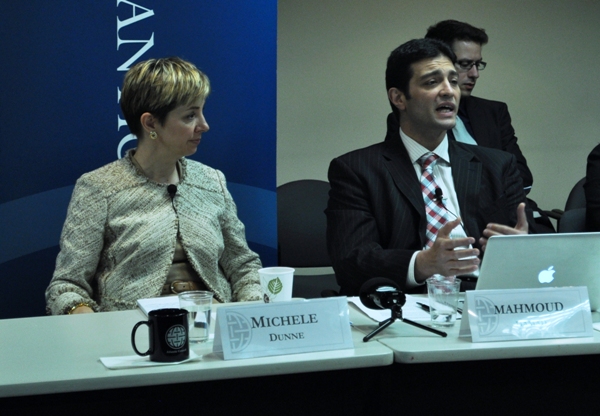On May 13, the Atlantic Council’s Rafik Hariri Center for the Middle East held an event to release a new issue brief, Egypt’s Litigious Transition: Judicial Intervention and the Muddied Road to Democracy. Director of the Rafik Hariri Center Michele Dunne moderated a discussion with the author Mahmoud Hamad, who is assistant professor at Drake University and Cairo University, and Yussef Auf, a nonresident fellow with the Hariri Center, who joined via Skype.
Hamad began by noting that Egypt’s judiciary has been more politically active since the fall of former president Hosni Mubarak than any other judiciary in the world. This activism has been, in his words, “counterproductive to both the democratic consolidation process and the prospects for the rule of law.” He outlined how Egypt’s judiciary has inserted itself into politics time and again, beginning with the popular but political decision to dissolve the ruling National Democratic Party. This decision set a dangerous precedent in which legal actions began to take the place of political decisions. Hamad classified judicial intervention into three categories: dismantling the old regime, restructuring political institutions, and shaping the constitutional order. He also discussed the bias of the court, which generally is opposed to Islamist parties and is representative of the old order. Largely because of this, President Mohamed Morsi has attempted to push the judiciary out of politics. Hamad predicted that this struggle between the presidency and the courts will continue for the foreseeable future, and discussed the possibility of Morsi lowering the retirement age in order to push out the old guard.
Auf added to Hamad’s analysis by explaining the reasons that the judiciary has taken on such a significant role since the transition. He argued that the fall of Mubarak created a political vacuum which the Supreme Council of the Armed Forces (SCAF) refused to fill, creating space for the judiciary to insert itself. The SCAF also refused to put forth a plan for transitional justice, so the courts did not have the tools to properly handle the unique legal challenges that arose out of the transition. In light of the political parties’ inability to reach a consensus about the direction of the country, the courts were forced to step in.
Dunne questioned whether circumstances had forced the judiciary to take a more political role, to which Hamad responded that not only did the judiciary feel the need to step in when the SCAF failed to take on a leadership role, but there is also a history of judicial activism in Egypt that dates back well before the transition period.
Click here to download the full report
Image: MD%20MH.jpg
